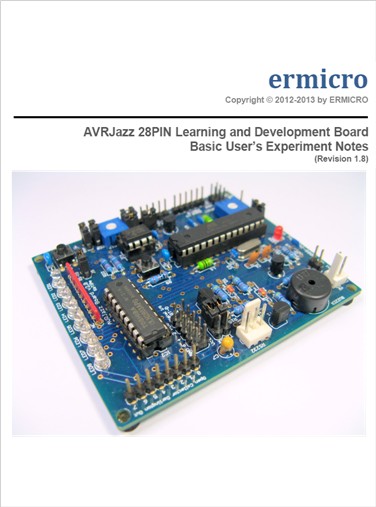Welcome to ermicroblog
Tuesday July 01, 2025Are you looking for something fresh, update and simple explanation on the microcontrollers and electronics concept?
Here at ermicroblog we always bake fresh new projects,
tutorials, and ideas. Any sugestions and comments would be most welcome.
Have a pleasure reading and hope you enjoy visiting ermicroblog.
Feature Video
July 2017 Top 10 Pageviews
e-Book
Basic User’s Experiment Note

The “Basic User’s Experiment Note” is based on the popular 8-bit Atmel AVR ATmega328P microcontroller using AVRJazz 28PIN development board. This ebook covering most of the Atmel AVR ATmega328P microcontroller features and it’s aimed for the beginners, hobbyist, or anyone who wants to learn and understand the 8-bit Atmel AVR ATmega328P microcontroller powerful features. Read more »
Latest Entry
Make your own Microcontroller Printed Circuit Board (PCB) using the Toner Transfer Method
Sunday January 03, 2010 by rwb, under Electronics.
As the electronics hobbyist one of knowledge that we have to be familiar with is how to make our own printed circuit board (PCB). Making our own simple single side PCB actually is not require a sophisticated technique and technology as you might think, instead most of the required materials is already available at your home. I’ve started make my first single side through-hole PCB for a simple two transistors astable multivibrator project using just a water proof marker and draw the PCB layout directly on the PCB copper surface. Read more »
15 Comments
The 2009 Year End Notes
Friday December 18, 2009 by rwb, under Blognote.
First of all I would like to thank to all the ermicroblog readers. I started to write this blog about a year ago; precisely on December 2008, during this year I received a lot of comments and questions and some of it were on my email. For me there are no such a silly questions as I believe that as long as we live in this world we always in the continues learning mode state, therefore what seems silly to some people actually is a really serious question to the other people. I would do my best to answer all the questions regarding this blog contents; as answering the people’s question also is a part of the learning process. Read more »
No Comments
PIC18 Pulse Width Modulation (PWM) DC Motor Speed Controller with the RPM Counter Project
Wednesday December 09, 2009 by rwb, under Microcontroller.
Equipped with sophisticated Enhanced Capture/Compare/PWM (ECCP) peripheral the Microchip PIC18F14K50 microcontroller could produce up to four PWM channels output. The enhanced PWM (Pulse Width Modulation) mode in ECCP peripheral is capable to drive the full bridge DC Motor circuit directly both in forward or reverse direction. It also could generate single PWM output on the selectable PIC18F14K50 pins when it configured in pulse steering mode. Read more »
30 Comments
PIC18 Microcontroller Analog to Digital Converter with Microchip C18 Compiler
Sunday November 08, 2009 by rwb, under Microcontroller.
The Microchip PIC18 Microcontroller family is the Microchip highest performance 8-bit class microcontroller. Powered by advanced RISC CPU, this PIC18 microcontroller family could deliver up to 16 MIPS computing power compared to the other Microchip 8-bit microcontroller family such as PIC10, PIC12 and PIC16 which only could deliver up to 5 MIPS. The PIC18 microcontroller architecture is optimized to be programmed in C language and supporting many advance industrial standard interface peripherals such as I2C, SPI, UART, USB, CAN, Ethernet, LCD and Touch Screen; this make the PIC18 microcontroller family become a popular choice to the new 8-bit embedded system design. Read more »
2 Comments
Introduction to the Embedded System with PICAXE Microcontroller
Saturday October 17, 2009 by rwb, under Microcontroller.
These days we are living and surrounding by many tiny computers called embedded products. Unlike the general purpose desktop computer that we use for browsing or typing our email, this tiny computer is designed to do only a limited specific task. We could easily found this embedded product just about anywhere such as home appliance (e.g. washing machine, refrigerator, microwave oven, TV/DVD), personal gadget (e.g. cell phone, MP3 players, digital camera), car (e.g. anti lock brake system, GPS navigation, alarm) and many more. The tremendous use of the embedded products in our daily life make the embedded system become one of the most important and interest subject to be learned. Read more »
1 Comment
Transforming your AVR Microcontroller to the I2C or TWI Slave I/O Expander Project
Sunday September 27, 2009 by rwb, under Microcontroller.
The I2C bus (read as I squared C) is one of the most important embedded system serial bus interface first introduced by Philips in 1980; using just two lines called SCL (serial clock) and SDA (serial data) respectively make the I2C bus is a perfect choice to provide additional I/O capabilities to your microcontroller project without changing your microcontroller type and design in order to increase the I/O port pins. Read more »
7 Comments
Build Your Own Microcontroller Based PID Control Line Follower Robot (LFR) – Second Part
Sunday August 30, 2009 by rwb, under Robotics.
One of the interesting parts in building the Line Follower Robot is; you could start it with a very simple version by using just two transistors with the LED and LDR for sensor (Build Your Own Transistor Based Mobile Line Follower Robot – First Part) and enhance it to the programmable version that use microcontroller as the brain for controlling the robot. The reason of using the microcontroller for the Line Follower Robot is we need to make more robust, reliable and flexible robot which you could not have it from the discrete electronics component robot without changing most of the electronic circuit design. Read more »
42 Comments
ermicroblog pages
Home | Login | Register | About
